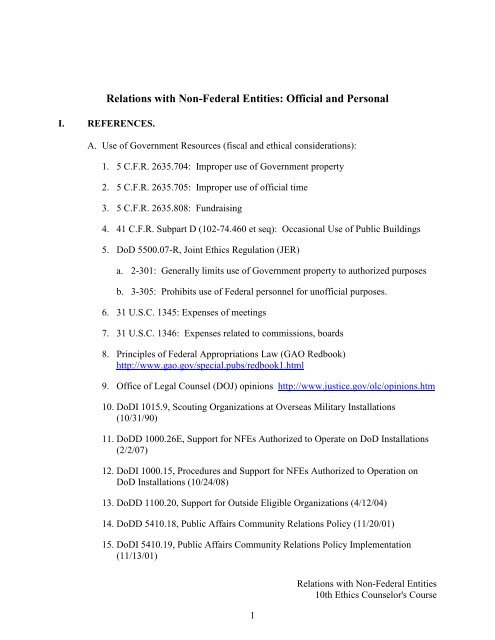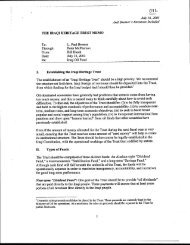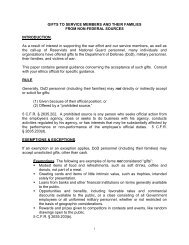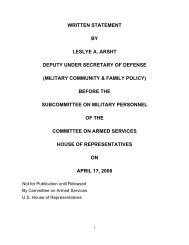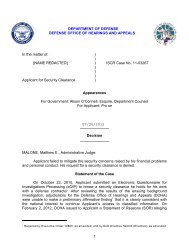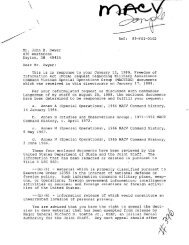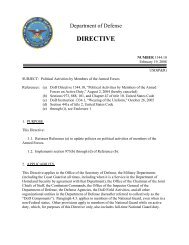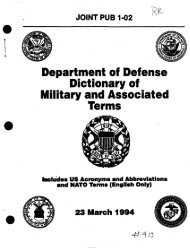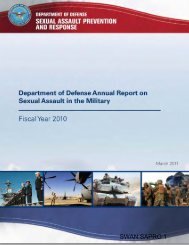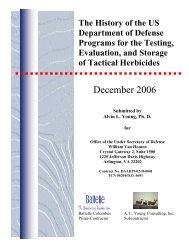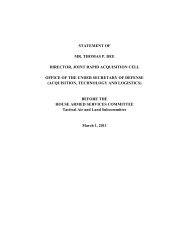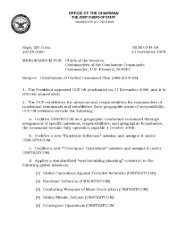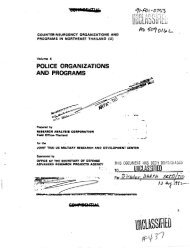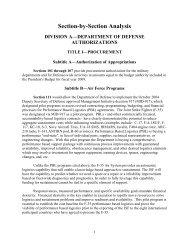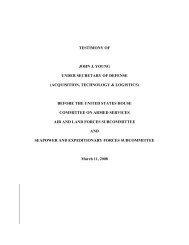relations with non-federal entities - United States Department of ...
relations with non-federal entities - United States Department of ...
relations with non-federal entities - United States Department of ...
- No tags were found...
You also want an ePaper? Increase the reach of your titles
YUMPU automatically turns print PDFs into web optimized ePapers that Google loves.
Relations <strong>with</strong> Non-Federal Entities: Official and PersonalI. REFERENCES.A. Use <strong>of</strong> Government Resources (fiscal and ethical considerations):1. 5 C.F.R. 2635.704: Improper use <strong>of</strong> Government property2. 5 C.F.R. 2635.705: Improper use <strong>of</strong> <strong>of</strong>ficial time3. 5 C.F.R. 2635.808: Fundraising4. 41 C.F.R. Subpart D (102-74.460 et seq): Occasional Use <strong>of</strong> Public Buildings5. DoD 5500.07-R, Joint Ethics Regulation (JER)a. 2-301: Generally limits use <strong>of</strong> Government property to authorized purposesb. 3-305: Prohibits use <strong>of</strong> Federal personnel for un<strong>of</strong>ficial purposes.6. 31 U.S.C. 1345: Expenses <strong>of</strong> meetings7. 31 U.S.C. 1346: Expenses related to commissions, boards8. Principles <strong>of</strong> Federal Appropriations Law (GAO Redbook)http://www.gao.gov/special.pubs/redbook1.html9. Office <strong>of</strong> Legal Counsel (DOJ) opinions http://www.justice.gov/olc/opinions.htm10. DoDI 1015.9, Scouting Organizations at Overseas Military Installations(10/31/90)11. DoDD 1000.26E, Support for NFEs Authorized to Operate on DoD Installations(2/2/07)12. DoDI 1000.15, Procedures and Support for NFEs Authorized to Operation onDoD Installations (10/24/08)13. DoDD 1100.20, Support for Outside Eligible Organizations (4/12/04)14. DoDD 5410.18, Public Affairs Community Relations Policy (11/20/01)15. DoDI 5410.19, Public Affairs Community Relations Policy Implementation(11/13/01)1Relations <strong>with</strong> Non-Federal Entities10th Ethics Counselor's Course
16. 5 C.F.R. 251.202: Agency Support to Private Organizations Representing orServing Federal Employees17. Opinions <strong>of</strong> the Comptroller General: http://www.gao.gov/legal.htmB. Preferential Treatment:1. 5 C.F.R. 2635.702(b): Appearance <strong>of</strong> governmental sanction2. 5 C.F.R. 2635.702(c): Endorsements3. 5 C.F.R. 2635.808: Fundraising4. DoD 5500.07-R, Joint Ethics Regulation (JER), Change 7, 11/17/2011a. JER 3-209: Endorsementb. JER 3-211: Support for eventsC. Conflicts <strong>of</strong> Interest:1. JER 3-202: Management <strong>of</strong> private organizations2. JER 3-304: Prior approval <strong>of</strong> outside employment and business activitiesD. Conferences (may repeat authorities listed)1. Federal Government-widea. White House Memorandum, Eliminating Excess Conference Spending andPromoting Efficiency in Government, Sep. 21, 2011(www.whitehouse.gov/sites/default/files/omb/memoranda/2011/m11-35.pdf).b. Office <strong>of</strong> Legal Counsel Memorandum Opinion for the General Counsel,Environmental Protection Agency, Use <strong>of</strong> Appropriated Funds to ProvideLight Refreshments to <strong>non</strong>-Federal Participants at EPA Conferences, April 5,2007. (www.justice.gov/olc/2007/epa-light-refreshments13.pdf)c. GSA Guidance for Conducting Conferences, Aug. 1, 2008.d. Decisions <strong>of</strong> the Comptroller General.2Relations <strong>with</strong> Non-Federal Entities10th Ethics Counselor's Course
(1) Letter from the GAO to the Honorable Barbara A. Mikulski, ContractorsCollecting Fees at Agency-Hosted Conferences, B-306663, January 4,2006 (www.gao.gov/decisions/appro/306663.pdf)(2) Letter from the GAO to the National Institutes <strong>of</strong> Health – Food atGovernment-Sponsored Conferences, B-300826, March 3, 2005(www.gao.gov/decisions/appro/300826.htm)e. U.S. Office <strong>of</strong> Government Ethics, Conferences: A guide for Ethics Officials(version 1.0), dated May 2008.2. <strong>Department</strong> <strong>of</strong> Defensea. 10 U.S.C. § 2262, <strong>Department</strong> <strong>of</strong> Defense conferences: collection <strong>of</strong> fees tocover <strong>Department</strong> <strong>of</strong> Defense costs (www.gpo.gov/fdsys/pkg/USCODE-2010-title10/pdf/USCODE-2010-title10-subtitleA-partIV-chap134-subchapIIsec2262.pdf)b. DoD 7000.14-R, Financial Management Regulation(http://comptroller.defense.gov/fmr/index.html)c. Conference Fee collection, Vol. 12, Chap. 32(http://comptroller.defense.gov/fmr/12/12_32.pdf)3. Secretary <strong>of</strong> Defense Memoranda:a. Consideration <strong>of</strong> Costs in DoD Decision-Making, dated Dec. 27, 2010b. Track Four Efficiencies Initiative Decisions, Mar. 14, 2011.4. <strong>Department</strong> <strong>of</strong> the Air Forcea. AFI 65-601v1, Budget Guidance and Procedure, paragraph 4.42(www.af.mil/shared/media/epubs/AFI65-601V1.pdf)b. Memorandum, SAF/GCA, Subject: Government Accountability Office (GAO)and <strong>Department</strong> <strong>of</strong> Defense (DoD) General Counsel’s Office Opinions onConference Fees and Providing Food at Conferences, 5 October 2005.3Relations <strong>with</strong> Non-Federal Entities10th Ethics Counselor's Course
c. Policy Memorandum, Conferences, dated Oct. 28, 2011.5. <strong>Department</strong> <strong>of</strong> the Armya. Directive 2011-20, <strong>Department</strong> <strong>of</strong> Army – Conferences, dated Oct. 14, 2011(http://armypubs.army.mil/epubs/pdf/ad2011_20.pdf).b. Directive 2011-05, <strong>Department</strong> <strong>of</strong> Army Conferences, Symposia, Seminarsand Meetings, dated Apr. 20, 2011(http://armypubs.army.mil/epubs/pdf/ad2011_05_obs.pdf).6. <strong>Department</strong> <strong>of</strong> the Navya. OPNAVINST 5050.24F(http://doni.daps.dla.mil/Directives/05000%20General%20Management%20Security%20and%20Safety%20Services/05-00%20General%20Admin%20and%20Management%20Support/5050.24F.pdf)b. U.S. Marine Corpsi. MCO 7300.22A, Controlling Conference Costs, dated Apr. 11, 2004www.marines.mil/news/publications/Documents/MCO%207300.22A.pdfii. MARADMIN 229/07, Controlling Conference Costs, dated Mar. 27, 2007(www.marines.mil/news/messages/Pages/2007/CONFERENCE%20FEES.aspx).iii. MARADMIN 525/08, Controlling Conference Costs, dated Sep. 19, 2008(www.marines.mil/news/messages/Pages/MARADMIN525-08.aspx).7. National Guard Bureau, Memorandum, NGB-ARZ, Subject: ARNG Policy for theConduct <strong>of</strong> Official Conferences and Meetings, 1 May 2005.E. Army Guidance:1. Private Organization Reference Guide (October 1998)2. AR 210-22, Private Organizations on <strong>Department</strong> <strong>of</strong> the Army Installations(October 22, 2001)3. AR 360-1, The Army Public Affairs Program (9/15/00)4Relations <strong>with</strong> Non-Federal Entities10th Ethics Counselor's Course
4. AR 600-29, Fund-Raising <strong>with</strong>in the <strong>Department</strong> <strong>of</strong> the Army (6/1/01)5. AR 600-20, Army Command Policy (3/18/08)F. Air Force Guidance:1. AFI 34-223, Private Organization Program2. AFI 35-101, Public Affairs Policy and Procedures3. AFI 36-3101, Fundraising Within the AF4. AFI 36-3105, Red Cross Activities Within the AF5. AFI 36-3109, Air Force Aid Society6. AFI 51-902, Political Activities by AF Members7. AFI 61-205, Sponsoring or Co-Sponsoring Conferences8. AFI 90-401, AF Relations <strong>with</strong> CongressG. Navy/Marine Corps Guidance.1. SECNAVINST 5340.7, Active Duty Fund Drive in Support <strong>of</strong> the Navy-MarineCorps Relief Society (NMCRS)2. SECNAVINST 5720.44B, Public Affairs Policy and Regulations3. SECNAVINST 1740.2E, Solicitation and Conduct <strong>of</strong> Personal CommercialAffairs4. <strong>United</strong> <strong>States</strong> Navy Regulations, Chapter 11, Section 25. OPNAVINST 5760.5C, Navy Support and Assistance to Youth GroupsH. Internet Locations <strong>of</strong> Referenced Materials.1. C.F.R.: http://www.gpoaccess.gov/cfr/index.html2. JER: http://www.dod.mil/dodgc/defense_ethics/3. DoD Directives and Instructions: http://www.dtic.mil/whs/directives/4. Office <strong>of</strong> Government Ethics: http://www.oge.gov/5Relations <strong>with</strong> Non-Federal Entities10th Ethics Counselor's Course
II.ETHICAL PRINCIPLES.A. Personnel shall not use Government property for other than authorized purposes.(5 C.F.R. 2635.101(b)(9))B. Personnel shall not use public <strong>of</strong>fice for private gain. (5 C.F.R. § 2635.101(b)(7))C. Personnel shall not give preferential treatment to any private organization orindividual. (5 C.F.R. § 2635.101(b)(8))D. Personnel shall not participate in <strong>of</strong>ficial matters that conflict <strong>with</strong> personal interests.(5 C.F.R. 2635.402 and 2635.502)See, the 14 Principles <strong>of</strong> Ethical Conduct issued by Executive Order 12647 (4/12/1989) andboth the Standards <strong>of</strong> Ethical Conduct for Employees <strong>of</strong> the Executive Branch and the JointEthics Regulation.In analyzing <strong>relations</strong> <strong>with</strong> <strong>non</strong>-Federal <strong>entities</strong> (NFEs) and applying the principles,determining whether participation by DoD personnel will be in their <strong>of</strong>ficial or personalcapacity is the first step. The following paragraphs roughly track increasing levels <strong>of</strong><strong>relations</strong>hip from mere meeting attendance to significant support, evaluating <strong>of</strong>ficial andpersonal capacity participation for each activity.III.ATTENDING NFE MEETINGS OR OTHER EVENTSA. Official Capacity: JER 3-200 permits agency designees to authorize DoD personnelin their <strong>of</strong>ficial capacity to attend meetings and similar events sponsored by NFEs atGovernment expense and time if the meetings serve a legitimate <strong>of</strong>ficial purpose.(See 5 U.S.C. 4109 and 4110; 31 U.S.C. 1345; and 37 U.S.C. 412)1. Agency designees may also authorize such attendance at no additional cost to theGovernment when there is a legitimate purpose.2. Agency <strong>relations</strong>hips <strong>with</strong> organizations representing Federal personnel and otherorganizations: The Office <strong>of</strong> Personnel Management (OPM) requires consultation<strong>with</strong> associations that represent Federal personnel by management <strong>of</strong>ficials and/orsupervisors, and permits support to other organizations when such actions wouldbenefit the agency’s programs or be warranted as a service to employees who aremembers <strong>of</strong> the organization. Such support includes use <strong>of</strong> agency equipment toprepare papers, payment <strong>of</strong> travel to attend pr<strong>of</strong>essional meetings (for employeedevelopment or when directly related to agency functions), liberal leave to attendmeetings, and use <strong>of</strong> Government information systems to inform employees <strong>of</strong>meetings. 5 C.F.R. 251.2023. Agency Designees should generally decline such attendance when the eventprovides a limited audience, for example the <strong>of</strong>ficers and board members <strong>of</strong> one6Relations <strong>with</strong> Non-Federal Entities10th Ethics Counselor's Course
company and/or its clients or customers, or has the appearance <strong>of</strong> providingspecial access to senior DoD <strong>of</strong>ficials.B. Personal Capacity: Attendance is generally allowed so long as it is clear thatpersonnel are attending in their personal capacities and acting exclusively outside thescope <strong>of</strong> their <strong>of</strong>ficial positions. (JER 3-300.a.)IV.REPRESENTING DOD TO, OR SERVING WITH, NFESOften NFEs will invite DoD personnel to serve in either an <strong>of</strong>ficial or personal capacityon one <strong>of</strong> their boards, councils, or committees, including advisory boards.A. Official Capacity: In lieu <strong>of</strong> allowing DoD personnel to serve directly on thosebodies in their <strong>of</strong>ficial capacity, which would require them to owe a duty <strong>of</strong> loyalty toserve the NFE’s interests, such personnel must serve as DoD liaisons. Under JER 3-201, Heads <strong>of</strong> DoD Component organizations may appoint DoD personnel as liaisonsto represent DoD interests to NFEs when they determine that there is a significantand continuing DoD interest in such representation. DoD personnel perform therepresentation as an <strong>of</strong>ficial duty and may discuss matters <strong>of</strong> mutual interest.Liaisons must inform the NFE that their opinions do not bind DoD or any <strong>of</strong> itscomponents.1. When membership <strong>with</strong> an NFE is required, DoD may purchase an organizationmembership or accept free membership as a gift to DoD. DoD may not useappropriated funds to purchase individual memberships in NFEs. See 5 U.S.C.5946.2. Fiscal laws apply: Liaison activities must satisfy an authorized agency purpose.3. Liaisons may not participate in management (internal, day-to-day management) orcontrol <strong>of</strong> the NFE, but may serve on advisory committees.4. Liaisons do not have a conflict <strong>of</strong> interest because they represent only DoD, <strong>with</strong>no fiduciary duty to the NFE.5. Because they act in their <strong>of</strong>ficial capacity, personnel may use Government time,resources, and personnel to perform that function. They may also use their title,position or organization name.6. Since personnel act <strong>with</strong>in their scope <strong>of</strong> <strong>of</strong>fice, their personal liability is limited.B. Personal Capacity: Unless an outside activity is prohibited by statute or DoDregulation, or otherwise conflicts <strong>with</strong> their <strong>of</strong>ficial duties, DoD personnel mayvoluntarily become members <strong>of</strong>, and actively participate in, NFEs, such aspr<strong>of</strong>essional associations, civic, religious, or scouting groups, etc. When doing so,they must act exclusively outside the scope <strong>of</strong> their <strong>of</strong>ficial position.7Relations <strong>with</strong> Non-Federal Entities10th Ethics Counselor's Course
1. If they serve <strong>with</strong> or want to represent such <strong>entities</strong> to Federal agencies, thefollowing limitations apply:a. When such personnel are <strong>of</strong>ficers, directors, trustees, general partners, oremployees <strong>with</strong> the NFE, they may not participate in their <strong>of</strong>ficial capacity atDoD in any particular matters that may directly and predictably affect theNFE. They may request a waiver if their interests are not so substantial as toaffect their integrity. (18 U.S.C. 208)b. When such personnel are active participants <strong>with</strong> the NFE (serving oncommittees, boards, etc), but not at the level in 1., above, they may notparticipate in their <strong>of</strong>ficial capacity in any particular matters that may directlyand predictably affect the NFE, or in which the NFE is, or represents, a party.They may request an authorization to participate from their Agency Designeebased on a determination that the interests <strong>of</strong> the Government outweighpotential questions about the integrity <strong>of</strong> the agency’s programs. (5 C.F.R.2635.502; JER 3-302)c. Federal personnel may not act as an agent for, or represent, an NFE beforeFederal agencies or courts on particular matters in which the Government is aparty or has a direct and substantial interest. (18 U.S.C. 203 & 205)Note: 18 U.S.C. § 205(d)(1)(B) permits Federal personnel to represent(<strong>with</strong>out compensation) <strong>non</strong>-pr<strong>of</strong>it pr<strong>of</strong>essional, recreational, or similargroups if the majority <strong>of</strong> the organization's members are Federal personnel ortheir dependents. (Limitations set out in 18 U.S.C. 205(d)(2).)d. DoD personnel may not (in their <strong>of</strong>ficial capacity) give their NFE preferentialtreatment, and they must ensure that they do not create an appearance thatthey are using their public <strong>of</strong>fice to assist the NFE in any way. (5 C.F.R.2635.702)e. DoD personnel may not (in their <strong>of</strong>ficial capacity) endorse the NFE. Nor maythey use, or permit the NFE to use, their <strong>of</strong>ficial titles, positions, ororganization names in connection <strong>with</strong> the NFE, which includes on the NFE’swebsite, or any list, letterhead, or promotional materials. Active militarymembers may use their rank and Service when identifying themselves inconnection <strong>with</strong> the NFE. Retired members may do so only if they clearlyidentify the retired or inactive Reserve status. (5 C.F.R. 2635.702(c) and JER3-300 a (1))f. DoD personnel may not encourage, pressure, or coerce other personnel,especially subordinates, to join, support, or otherwise participate in outsideorganizations. (5 C.F.R. 2635.702(a))g. They may not personally solicit funds for the NFE from subordinates orprohibited sources. (5 C.F.R. 2635.808(c))8Relations <strong>with</strong> Non-Federal Entities10th Ethics Counselor's Course
h. They may not use appropriated funds, Government resources or <strong>of</strong>ficialpersonnel to assist them in their work for the NFE. Note that AgencyDesignees may allow personnel the limited use <strong>of</strong> certain resources underspecific, narrow exceptions, which they may use in connection <strong>with</strong> their NFEparticipation. See B., below; JER 2-301.b., and 3-300(b).i. They may not disclose <strong>non</strong>-public Government information to the NFE. (5C.F.R. 2635.703))j. If they file financial disclosure reports, DoD personnel must disclose theposition <strong>with</strong> the NFE on their next annual report after appointment. If theNFE provides any travel expenses or other compensation, they must alsodisclose any reportable amounts. (5 C.F.R. 2634.307)k. Personnel have no <strong>of</strong>ficial protection from liability stemming from theirservice to the NFE.2. The following exceptions allow Agency Designees to permit their personnel thelimited use <strong>of</strong> certain resources.a. Community Support Activities: When DoD personnel are voluntarilyparticipating in community support activities that promote civic awareness orin uncompensated public service, such as blood donations and voterregistration, Agency Designees may grant excused absence (administrativeleave) under JER 3-300.c.b. Pr<strong>of</strong>essional Associations: Under JER 3-300.b, Agency Designees may grantpersonnel excused absences for reasonable periods for voluntary participationin <strong>non</strong>-pr<strong>of</strong>it pr<strong>of</strong>essional associations, and may provide limited use <strong>of</strong> DoDequipment and support services (including personnel) for papers to bepublished in pr<strong>of</strong>essional journals or presented at association events if thepaper relates to <strong>of</strong>ficial duties, gives a benefit to the agency, and does notinterfere <strong>with</strong> performance <strong>of</strong> duties.Receiving compensation for such papers is generally barred by 5 C.F.R.2635.807.c. Use <strong>of</strong> Government Resources by DoD personnel serving in a personalcapacity.(1) Agency Designees may allow limited personal use <strong>of</strong> Federal Governmentresources, other than personnel, if such use:(a) Does not adversely affect performance <strong>of</strong> <strong>of</strong>ficial duties,(b) Is <strong>of</strong> reasonable duration and frequency and not on <strong>of</strong>ficial time,9Relations <strong>with</strong> Non-Federal Entities10th Ethics Counselor's Course
V. ADVISING NFES(c) Serves a legitimate public interest,(d) Does not reflect adversely on DoD, and(e) Creates no significant additional cost to DoD. (JER 2-301b)(2) Note that Agency Designees may allow their personnel to use resources,as restricted above, but they may not allow NFEs to directly use thoseresources under this authority.A. Official Capacity: DoD personnel, in their <strong>of</strong>ficial capacities, generally should notserve as advisors or consultants, or serve on advisory boards <strong>of</strong>, NFEs that are DoDcontractors or commercial <strong>entities</strong> that do business <strong>with</strong> DoD.1. Organizations and businesses that work <strong>with</strong> DoD <strong>of</strong>ten seek DoD personnel toadvise them or sit on “customer panels,” user, or similar groups. Whileparticipation in such groups is not prohibited, because it may raise substantialconflicts <strong>of</strong> interest, appearances <strong>of</strong> preferential treatment, risk <strong>of</strong> disclosure <strong>of</strong><strong>non</strong>public information, endorsement, and abuse <strong>of</strong> <strong>of</strong>fice issues, such participationis rare. See DoD General Counsel memo <strong>of</strong> May 7, 1999(http://www.dod.mil/dodgc/defense_ethics/dod_oge/AdvDefContractors.htm)for more specific guidance.2. Note that <strong>of</strong>ten this “advising contractors” concern may be eliminated byincluding such consultation as part <strong>of</strong> the contract for service, system, or s<strong>of</strong>tware.(For example, contracts for particular s<strong>of</strong>tware may include periodic feedbackmeetings between the supplier and customer.)B. Personal Capacity: DoD personnel, in their personal capacities, may participate asadvisors, consultants, or on advisory boards <strong>of</strong> NFEs, provided they act exclusivelyoutside the scope <strong>of</strong> their <strong>of</strong>ficial position. See IV.B.1., above, for precautions totake. DoD policy, however, strongly discourages such participation <strong>with</strong> DoDprohibited sources when there is a high risk <strong>of</strong> inadvertent violations or theappearance <strong>of</strong> such violations.1. Participation on advisory boards or curriculum advisory committees <strong>of</strong> academicinstitutions, or advisory committees <strong>of</strong> pr<strong>of</strong>essional associations may not beinappropriate even when these organizations are prohibited sources.VI.PARTICIPATING IN PROFESSIONAL OR STANDARD SETTING NFESA. Official Capacity: When appropriate and authorized, the Head <strong>of</strong> DoD Componentorganizations may appoint and authorize DoD personnel to become activeparticipants as members <strong>of</strong> boards <strong>of</strong> certain NFEs, such as consensus standardsorganizations. The activity <strong>of</strong> the NFE must concern the mission <strong>of</strong> the DoD10Relations <strong>with</strong> Non-Federal Entities10th Ethics Counselor's Course
organization. Ethics Counselors must play an active role in making thesedeterminations. See DoD 4120.24-M, “DoD Standardization Program” (3/9/00) forfurther guidance. When so appointed, DoD personnel may serve as chairpersons andvote on behalf <strong>of</strong> DoD, but may not manage or control the NFE.B. Personal Capacity: See IV.B.1., above, for precautions to take.VII.MANAGING NFESA. Official Capacity: Except for the exceptions below, DoD personnel in their <strong>of</strong>ficialcapacity are prohibited from participating in the management <strong>of</strong>, or serving asdirectors, <strong>of</strong>ficers, or trustees (or other similar positions) for NFEs. DoD personnelmay so participate only pursuant to statute and <strong>with</strong> the approval <strong>of</strong> DoD GeneralCounsel. See JER 3-202. Such participation raises several conflicts <strong>of</strong> interest issuesand other problems.1. Violation <strong>of</strong> 18 U.S.C. 208: Federal personnel may not take <strong>of</strong>ficial actions inparticular matters that have a direct and predictable effect on the financialinterests <strong>of</strong> organizations in which they serve as director, <strong>of</strong>ficer, or employee.a. See Office <strong>of</strong> Legal Counsel Memorandum to Howard M. Shapiro, GeneralCounsel, FBI, from Beth Nolan, Deputy Assistant Attorney General,November 5, 1996.b. "An employee appointed to a position <strong>with</strong> an organization such as theSociety may have a fiduciary duty to act in the best interest <strong>of</strong> the Society inaccordance <strong>with</strong> state law; to the extent he also has a duty to act in theGovernment's best interest, these conflicting obligations may presentproblems for the Government employee.” OGE letter to Barbara S.Fredericks, Dept <strong>of</strong> Commerce, November 18, 1992.c. Confusing allegiance: When Federal personnel manage an NFE as part <strong>of</strong>their <strong>of</strong>ficial duties, it is easy for them, the public, and members <strong>of</strong> the NFE toassume the Federal employee is working for the NFE. Specific issues ariseinvolving:(1) Release <strong>of</strong> <strong>non</strong>-public information;(2) Appearance <strong>of</strong> <strong>of</strong>ficial sanction;(3) Fundraising;(4) Lobbying;(5) Dealings <strong>with</strong> DoD or other Federal agencies;(6) Use <strong>of</strong> Government resources;11Relations <strong>with</strong> Non-Federal Entities10th Ethics Counselor's Course
(7) Compensation; and(8) Confusion by outsiders as to Federal employee’s role.2. Express statutory authority: Some statutes provide express authority for DoDpersonnel to serve in management positions <strong>of</strong> NFEs. The statute eliminates aconflict <strong>of</strong> interest. Ethics counselors should play an active role in determiningwhether the express authority exists. See, e.g., 22 U.S.C. 4605.3. Implied statutory authority: When there is an implication that a statute mayprovide the authority to serve in management positions <strong>of</strong> NFEs, or there is n<strong>of</strong>iduciary duty to the entity (for example, some private standards-settingorganizations), cognizant ethics counselors may submit a written request to theDoD General Counsel, through their chain <strong>of</strong> command, for authorization for suchparticipation.a. See Office <strong>of</strong> Legal Counsel Memorandum to Marilyn Glynn, GeneralCounsel, OGE, from Beth Nolan, Deputy Assistant Attorney General, August24, 1998; also OGE memorandum, DO-98-025, September 2, 1998.http://www.usoge.gov/pages/daeograms/dgr_files/1998/do98025.txt.b. There must be fiscal authority to expend appropriated funds for the purpose <strong>of</strong>managing the particular <strong>non</strong>- Federal entity.4. Statutory Authorization for Designated Entities: 10 U.S.C. 1033(b) and 1589(b)permit Service Secretaries (<strong>with</strong> the concurrence <strong>of</strong> DoD General Counsel) toauthorize <strong>of</strong>ficial participation in management <strong>of</strong> four military welfare societies,<strong>entities</strong> that regulate international athletic competition, <strong>entities</strong> that regulate andsupport athletic programs <strong>of</strong> the service academies, <strong>entities</strong> that accredit serviceacademies and other schools <strong>of</strong> the armed forces, <strong>entities</strong> that regulate militaryhealth care, and <strong>entities</strong> in a foreign nation that promote understanding betweenthe military personnel serving in that nation and the citizens <strong>of</strong> that nation. SeeJER 3-202. Note that the General Counsel cannot approve managing <strong>entities</strong>outside this narrow list and meeting these specific criteria.a. Appropriated funds may be used only in the direct support <strong>of</strong> the DoDpersonnel. They may not be used for travel or transportation costs incurred bythe personnel in a travel status.b. As <strong>of</strong> April 2007, in addition to the relief societies, several DoD personnelhave been approved for positions on the following <strong>entities</strong>: SouthernAssociation <strong>of</strong> Colleges and Schools, Middle <strong>States</strong> Association <strong>of</strong> Collegesand Schools, Mountain West Conference, Conference USA, and the PatriotLeague.B. Personal Capacity: DoD personnel may manage <strong>non</strong>-Federal <strong>entities</strong> in theirpersonal capacity. See JER 3-301. Except for JER 3-210 organizations, however,12Relations <strong>with</strong> Non-Federal Entities10th Ethics Counselor's Course
DoD personnel may not so serve if the NFE position is <strong>of</strong>fered because <strong>of</strong> theindividual’s assignment or position. The personnel must ensure that theirparticipation is exclusively outside the scope <strong>of</strong> their <strong>of</strong>ficial positions. See IV.B.1.,above, for precautions to take.1. For an extensive discussion <strong>of</strong> the application <strong>of</strong> 18 U.S.C. 205 & 208 in thesesituations, see January 27, 1994, memo from Stuart Frish, Acting GeneralCounsel, Justice Management Division <strong>of</strong> DOJ, "Application <strong>of</strong> Federal Conflict<strong>of</strong>-InterestStatutes to Federal Employees Working With or For Non-FederalEntities That Do Business <strong>with</strong> the <strong>United</strong> <strong>States</strong>."2. Flag and General Officers may not accept compensation for serving as <strong>of</strong>ficers ormembers <strong>of</strong> boards <strong>of</strong> NFEs in their personal capacities. Exceptions permitted,<strong>with</strong> approval <strong>of</strong> the Service Secretaries, for pr<strong>of</strong>essional associations and familyheld<strong>entities</strong>. (DepSecDef memo <strong>of</strong> July 23, 1996)3. Three and Four star Generals and Admirals: Senate Armed Services Committeepolicy prohibits three and four star generals and admirals from serving in themanagement <strong>of</strong>, or on the boards <strong>of</strong> directors <strong>of</strong>, companies that do business <strong>with</strong>DoD or focus their business on military personnel. This applies touncompensated as well as compensated service. The Committee’s rationale isthat the senior <strong>of</strong>ficers’ selection to the boards is based upon their senior militarystatus, and will be used by the company to give the appearance <strong>of</strong> <strong>of</strong>ficialendorsement or to attract the business <strong>of</strong> junior military personnel.4. COMMON PROBLEM: DoD personnel who are active participants in an NFEmay not take an <strong>of</strong>ficial action involving that NFE. This prevents such personnelfrom approving requests from subordinates to attend meetings, to speak at anevent, or to prepare papers for a meeting <strong>of</strong> the NFE. (See 5 CFR 2635.502; JER3-300.d).VIII. SUPPORTING NFE EVENTSA. Official DoD Conferences and Meetings: Although DoD conferences are <strong>of</strong>ficialevents not directly involving NFEs, because such conferences raise similar issuesthey are included here. Reference Supplement on Conference Sponsorship andConference Planning for additional information.1. The Secretary <strong>of</strong> Defense is authorized to collect fees from individuals andcommercial participants at DoD conferences. 10 U.S.C. 2262 (Section 1051 <strong>of</strong>the National Defense Authorization Act for FY 2007 (P.L. 109-364)).a. The statute authorizes DoD conference planners and managers to implementthe fee collection authority. The DoD Comptroller Memorandum, “Collectionand Retention <strong>of</strong> Conference Fees from Non-Federal Sources,” 2/12/ 07,http://www.dod.mil/dodgc/defense_ethics/resource_library/guidance.htm13Relations <strong>with</strong> Non-Federal Entities10th Ethics Counselor's Course
equires that collected fees must be credited to the appropriation or accountfrom which the conference costs are paid, must be used to pay or reimbursethose costs, and any amount that exceeds those costs must be deposited intothe Treasury as miscellaneous receipts. Components must have reimbursableauthority. See Volume 12, Chapter 32, <strong>of</strong> DoD 7000.14-R, the FinancialManagement Regulation, http://comptroller.defense.gov/fmr/index.html .b. All other Federal laws and regulations, including DoD regulations regardingconferences and conference planning, the Federal Acquisition Regulation, theDoD FAR Supplement, and the Joint Ethics Regulation must be followed.This authority does not increase or affect any other currently existingconference authority, other than allowing fee collection.2. Fees:Because receipts that exceed costs must be turned over to the Treasury asmiscellaneous receipts, the totality <strong>of</strong> the fees (attendance, vendor, and other)should be structured so as not to exceed the anticipated costs <strong>of</strong> the conference.a. Attendance Fees: DoD may charge attendees, including individualGovernment personnel, attendance fees. DoD may charge different rates forDoD personnel, other Federal and state government personnel, and others. Besure, however, to avoid any preferential treatment among NFEs.b. Vendor/Exhibitor and Other Fees: DoD may invite vendors or exhibitors tosubmit applications to display products or services related to the subjectmatter <strong>of</strong> the conference and may charge fees for such a display.(1) DoD personnel must select the vendors based on pre-established neutralcriteria, subject to space availability. They may not select vendors that arenot closely related to the subject matter or that otherwise appear to bepurchasing exhibition space solely to obtain access to senior DoD<strong>of</strong>ficials.(2) DoD personnel may select other Government agencies as vendors andexhibitors, but do not have statutory authority to charge a fee. Theyshould balance the overall costs <strong>of</strong> the conference and the value <strong>of</strong> theGovernment agency’s submission compared to those <strong>of</strong> commercialvendors.3. Prohibited Fees and Arrangements:a. The ability <strong>of</strong> DoD <strong>entities</strong> to charge fees from vendors or sponsors in acommercial milieu presents is ripe for ethical misadventures. Specificproblems include:(1) Giving preferential treatment to particular NFEs;Relations <strong>with</strong> Non-Federal Entities10th Ethics Counselor's Course14
(2) Creating or allowing the appearance that the conference is a joint venture<strong>of</strong> DoD and an NFE;(3) Endorsing an NFE; or(4) Permitting a vendor to sponsor receptions or other meetings that give thevendor special access to senior DoD personnel.b. Accordingly, the following practices should be avoided:(1) Allowing NFE logo to appear on presentation slides;(2) Allowing and recognizing NFE sponsorship <strong>of</strong> a session in exchange for afee;(3) Granting an NFE naming rights to the conference;(4) Giving special access to DoD senior <strong>of</strong>ficials for a sponsorship fee(Usually this is in the form <strong>of</strong> a reception or meal in which only NFEemployees and DoD personnel are invited);c. Within the parameters established above, the following practices are usuallyappropriate. Be advised, however, that generally accepted commercialconference funding practices may not be appropriate for DoD <strong>of</strong>ficialconferences:(1) Providing free attendance <strong>with</strong> the payment <strong>of</strong> exhibitor or vendor fees fora display booth;(2) Providing advertisement opportunities in a program, as long as the ad isclearly indicated as such and includes a disclaimer that the ad does notconstitute an endorsement by DoD;(3) Providing mention in the program and at the conference site <strong>of</strong>independent events (NFE sponsored) to which conference attendees areinvited;(4) Providing mention in the program/agenda, at the conference site, and/or onthe conference website <strong>of</strong> sponsorships, such as providing door prizes.4. Conference Costsa. Conference costs may include the costs and fees (including reasonable pr<strong>of</strong>it)associated <strong>with</strong> a contract to administer, coordinate, or manage theconference, including the collection <strong>of</strong> fees. Such costs are subject to separatereporting to Congress, and must be reasonable and <strong>with</strong>in common businesspractices. Any amount collected by the contractor that exceeds a reasonable15Relations <strong>with</strong> Non-Federal Entities10th Ethics Counselor's Course
conference expense must be deposited <strong>with</strong> the DoD conference account anddeposited into the Treasury as miscellaneous receipts.b. This authority does not supplement any other existing authority to payconference costs and does not authorize the payment <strong>of</strong> any costs other thanthose currently authorized. See, e.g., Chapter 4, Part C <strong>of</strong> the JFTR.5. DoD conference managers should consult <strong>with</strong> legal counsel to ensure compliance<strong>with</strong> applicable laws and regulations.6. The Secretary <strong>of</strong> Defense is required, no later than 45 days after the Presidentsubmits a fiscal year budget, to submit to the congressional defense committees abudget justification document summarizing use <strong>of</strong> this authority. Thisrequirement is reflected in the DoD FMR, Volume 12, Chapter 32, section320402. DoD conference managers should ensure that they can provide thefollowing statutorily required information:a. A list <strong>of</strong> all conferences conducted during the preceding two calendar yearsfor which fees were collected;b. For each conference on the list –(1) The estimated DoD costs <strong>of</strong> the conference;(2) The actual DoD costs <strong>of</strong> the conference, including a separate statement <strong>of</strong>the amount <strong>of</strong> any conference coordinator fees; and(3) The amount <strong>of</strong> fees collected.c. An estimate <strong>of</strong> the number <strong>of</strong> conferences for which fees will be collectedduring the calendar year in which the report is submitted7. Because they are <strong>of</strong>ficial activities, DoD <strong>of</strong>ficial seals and emblems may be usedto promote and endorse the events which are DoD-managed conferences. DoDpersonnel may <strong>of</strong>ficially promote and endorse the event.B. Co-sponsored (Co-Managed) Events:1. JER 3-206 prohibits a DoD Component organization from co-sponsoring events<strong>with</strong> a <strong>non</strong>-Federal entity (defined as developing the substantive aspects orproviding substantial logistical support) except for the following two types <strong>of</strong>events.a. DoD may co-sponsor a civic or community activity (fostering good <strong>relations</strong><strong>with</strong> the local community is in the best interests <strong>of</strong> DoD) when the activity isunrelated to the purpose or business <strong>of</strong> the co-sponsoring <strong>non</strong>-Federal <strong>entities</strong>.(DoDD 5400.18)16Relations <strong>with</strong> Non-Federal Entities10th Ethics Counselor's Course
. DoD may co-sponsor a conference, seminar, or similar event when all <strong>of</strong> thefollowing requirements are met:(1) The Head <strong>of</strong> a DoD Component organization determines that the(a) Subject matter is scientific, technical, or pr<strong>of</strong>essional issues relevantto its DoD mission, and(b) Purpose is to transfer Federally developed technology or stimulateinterest and inquiry into issues identified in (a) and the event is opento the public.(2) The DoD Agency DAEO determines that the <strong>non</strong>-Federal entity is arecognized scientific, technical, educational, or pr<strong>of</strong>essional organizationapproved for the purpose identified in (1)(b), <strong>with</strong> due consideration <strong>of</strong> theprohibition against providing preferential treatment to the NFE (meaningthat due consideration is given to similarly situated organizations);(a) If the DoD Component organization has co-sponsored an event <strong>with</strong>one particular NFE for a number <strong>of</strong> years, the Ethics Counselor mustdetermine if there are other similar conferences that providecomparable benefits to DoD for co-sponsorship and that meet thecriteria.(i) If there are no such similar conferences, the DoD Componentorganization may continue to co-sponsor <strong>with</strong> the same NFE.(ii) If there are such conferences, however, the Ethics Counselor mustengage the DoD personnel working on the conference anddetermine if they considered co-sponsoring <strong>with</strong> another NFE, andif not, why not. There may be valid reasons, but it looksincreasingly preferential as time goes on.(3) The co-sponsorship must be a bona fide co-sponsorship, not a veiledsubstitute for “hiring out” work on the DoD Component organization’sconference. That means that both the DoD Component organization andco-sponsor(s) participate, fairly equally in the substantive aspects (e.g.,development <strong>of</strong> the conference program, scope, theme, agenda, andspeakers). DoD may provide substantial logistical support. See NationalConference Services, Inc, and Direct Marketing Productions Inc., Comp.Gen. B-311137 (April 25, 2008). In other words, DoD’s participation issufficient to justify having its seal and name associated <strong>with</strong> the event andsubjecting the event to the funding and fee requirements <strong>of</strong> 10 U.S.C.2262, but does not rise to the level in which DoD treats the conference asits own or fully controls the substantive aspects.17Relations <strong>with</strong> Non-Federal Entities10th Ethics Counselor's Course
(4) There must also be a written Memorandum <strong>of</strong> Understanding (MOU) thatcomplies <strong>with</strong> sub-paragraph 3-206.b.4. <strong>of</strong> the JER. Note also that theFederal Acquisition Regulation and other procurement criteria may applyif any funding matters are included. Use care to ensure the personexecuting any agreement has authority to commit the Government. Avoiduse <strong>of</strong> multi-year agreements (i.e., “Confused Command hereby agrees topartner <strong>with</strong> Conference Conductor Coalition through 2015”) to reducerisk <strong>of</strong> fiscal and procurement problems.(5) Because DoD is an <strong>of</strong>ficial co-sponsor <strong>of</strong> the event, 10 U.S.C. 2262applies. The co-sponsor may collect fees on behalf <strong>of</strong> DoD. DoD mayprovide funds to the co-sponsor. However, the co-sponsor’s funds andDoD funds may not be commingled in any account. The MOU shouldexplicitly provide for responsibilities in the funding and money handlingareas. Should fees collected on DoD’s behalf exceed DoD’s agreedportion <strong>of</strong> the costs, they must be deposited into the Treasury asmiscellaneous receipts. 10 U.S.C. 2262 supersedes any provision <strong>of</strong>subsection 3-206 <strong>of</strong> the JER to the extent that it appears to conflict <strong>with</strong>the statute.(6) The event must comply <strong>with</strong> sub-paragraph 3-206.b.5. <strong>of</strong> the JER and 10U.S.C. 2262 so that the admission fees may not exceed the reasonablecosts <strong>of</strong> sponsoring the event or portion <strong>of</strong> the event that is co-sponsored.2. Practice tips:a. Because DoD may sponsor its own conferences and collect and use fees forthat purpose, and because the same funding restrictions apply to co-sponsoredconferences, we recommend that you encourage your clients to sponsor theirown conferences when there is a legitimate interest in doing so.b. There must be a legitimate, mutual interest, and an equitable sharing <strong>of</strong> thesubstantial aspects <strong>of</strong> the event between DoD and the NFE to have a bona fideco-sponsorship event.c. Because DoD is a co-sponsor, the event is considered an <strong>of</strong>ficial event and allapplicable Federal laws and regulations, including 10 U.S.C. 2262, apply.d. DoD <strong>of</strong>ficial seals and emblems may be used to promote and endorse theevent. DoD personnel may <strong>of</strong>ficially promote and endorse the event.e. The following are examples <strong>of</strong> ways in which DoD personnel may participatein a co-managed event:(1) Speak;18Relations <strong>with</strong> Non-Federal Entities10th Ethics Counselor's Course
(2) Participate in a committee <strong>with</strong> the co-manager to make substantivemanagement decisions concerning the event, such as planning the topic,agenda, arranging for speakers, etc; or(3) Use DoD resources, personnel, and time to perform <strong>of</strong>ficial work on theevent.C. Training Conferences:1. The head <strong>of</strong> a DoD Component command or organization may provide DoDpersonnel in their <strong>of</strong>ficial capacities, as part <strong>of</strong> their management responsibility,as speakers, panelists or other similar speaking roles in events sponsored by <strong>non</strong>-Federal <strong>entities</strong> when a substantial portion <strong>of</strong> the audience, i.e., greater than 20%,consists <strong>of</strong> DoD personnel, the primary purpose <strong>of</strong> the presentation involves thetraining or education <strong>of</strong> agency personnel, and all conditions <strong>of</strong> a trainingconference are met. (See DoDI 1430.04, Civilian Employee Training)Appropriated (O&M) funds may be used to pay expenses.2. Such participation must meet the fiscal requirements <strong>of</strong> agency interest.3. DoD personnel attending solely as speakers may not use training funds, but mustuse O&M funds. If such personnel also attend the event for training, they mayuse training funds.4. DoD personnel must weigh the value <strong>of</strong> the training <strong>of</strong>fered in light <strong>of</strong> othertraining opportunities.D. Authorized Support to NFEs and Their Events:1. General Rule: DoD may not provide unauthorized support to or endorsement <strong>of</strong>NFEs. Fiscal limitations and prohibitions on preferential treatment and <strong>of</strong>ficialendorsements generally prohibit providing support to <strong>non</strong>-Federal <strong>entities</strong>.a. Government resources, time, and equipment may not be used for unauthorizedpurposes. (31 U.S.C. 1301; 5 C.F.R. 2635.704 & 705; JER 2-301)b. Performance <strong>of</strong> services by Government personnel for private <strong>entities</strong>constitutes an improper use <strong>of</strong> appropriated funds, even if the Government iscompensated or reimbursed in kind. (34 Comp. Gen. 599 (1955))c. Employees shall act impartially and not give preferential treatment to anyprivate organization or individual. (5 C.F.R. 2635.101(b) (8))d. Employees may not use or permit use <strong>of</strong> their Government position, title, orauthority to endorse any product, service, or enterprise. (5 C.F.R.2635.702(c), JER 3-209)19Relations <strong>with</strong> Non-Federal Entities10th Ethics Counselor's Course
2. Exceptions to the Rule:a. Groups <strong>with</strong> special statutory authorizations. Many <strong>non</strong>-Federal <strong>entities</strong> havestatutory authorization for particular support. Some are referenced in JER3-212, and all are listed in DoDI 1000.15, Procedures and Support for NFEsAuthorized to Operation on DoD Installations (10/24/08).(1) American Registry <strong>of</strong> Pathology (10 U.S.C. 177)(2) Henry M. Jackson Foundation for the Advancement <strong>of</strong> Military Medicine(10 U.S.C. 178)(3) American National Red Cross (10 U.S.C. 2552, 2602; MOU to ReferenceI.A.12)(4) Boy Scouts Jamborees (10 U.S.C. 2554)(5) Girl Scouts International Events (Transportation) (10 U.S.C. 2555; DoDI1015.9 (10/31/90))(6) Shelter for Homeless (10 U.S.C. 2556)(7) National Military Associations (Assistance at National Conventions).(10 U.S.C. 2558 allows national military associations, designated by theSecretary <strong>of</strong> Defense, to receive limited support for their annual nationalconferences and conventions. Statute does not authorize similar supportfor regional conferences, conventions, or symposia. (See 4.10 <strong>of</strong> DoDD5410.18 and Enclosure 10 <strong>of</strong> DoDI 5410.19 for guidance on support.)Organizations currently designated by the Assistant Secretary <strong>of</strong> Defensefor Public Affairs for support for their national conferences:(a) Adjutant General Association <strong>of</strong> the <strong>United</strong> <strong>States</strong>;(b) Air Force Association;(c) Association <strong>of</strong> the <strong>United</strong> <strong>States</strong> Army;(d) Enlisted Association <strong>of</strong> the National Guard;(e) Marine Corps League;(f) National Guard Association <strong>of</strong> the <strong>United</strong> <strong>States</strong>;(g) Navy League;(h) Non-Commissioned Officers Association <strong>of</strong> the <strong>United</strong> <strong>States</strong> <strong>of</strong>America;20Relations <strong>with</strong> Non-Federal Entities10th Ethics Counselor's Course
(i) Reserve Officers Association <strong>of</strong> the <strong>United</strong> <strong>States</strong>;(8) National Veterans’ Organizations (Beds and Barracks) (10 U.S.C. 2551)(9) <strong>United</strong> Seaman's Service Organization (10 U.S.C. 2604)(10) Scouting: Cooperation and Assistance in Foreign Areas (10 U.S.C.2606; DoDI 1015.9)(11) Civil Air Patrol (10 U.S.C. 9441& 9442; 36 U.S.C. 40301)(12) Assistance for certain youth and charitable organizations (32 U.S.C.508; DoDD 1100.20);(13) Presidential Inaugural Ceremonies (10 U.S.C. 2553)(14) Specified Sporting Events (Olympics, Special Olympics) (10 U.S.C.2564 and DoDD 2000.15 (11/21/94));(15) Federal Credit Unions (12 U.S.C. 1770; DoDD 1000.11 (6/9/00))(16) Labor Organizations (5 U.S.C. Chapter 71, DoD 1400.25-M,subchapter 711)(17) Combined Federal Campaign (E.O. 12353; 5 C.F.R. part 950; DoDI5035.01 (3/1/08) (DoD fundraising); DoDI 5035.5 (10/12/99)(CFCoverseas))(18) USO (36 U.S.C. 220101; MOU to Reference I.A.12)(19) Fire Protection Agreements (42 U.S.C.1856a)(20) ASYMCA (10 U.S.C. 2012 & 2648; 32 U.S.C. 508; MOU toReference I.A.12)(21) Recognized Youth Organizations (Section 8126, “Support for YouthOrganizations” in the FY 2006 Defense Appropriation Act, which expandsthe list <strong>of</strong> recognized youth organizations:(http://www.dod.mil/dodgc/defense_ethics/resource_library/2006_Support_Youth.doc).b. Annual DoD Authorization Acts and DoD Appropriations Acts frequentlycontain special authority. See, for example, the previously referencedC.2.a.21, expanding the list <strong>of</strong> recognized youth organizations. Most changescontained in special authority are incorporated in the U.S. Code, but some,which are one-time events, are not.21Relations <strong>with</strong> Non-Federal Entities10th Ethics Counselor's Course
c. Relief societies. Support for specified military relief societies in accordance<strong>with</strong> Military <strong>Department</strong> regulations is authorized:(1) Army: AR 930-4, Army Emergency Relief;(2) Navy and Marine Corps: SECNAVINST 5340.7, Active Duty Fund Drivein Support <strong>of</strong> the Navy-Marine Corps Relief Society (NMCRS);(3) Air Force: AFI 36-3101: Fundraising Within the Air Force;(4) 10 U.S.C. 2566 authorizes the Military <strong>Department</strong>s to provide space andservices (heating, lighting, phones) to these relief societies.d. Private Organizations Operating on DoD Installations.(1) DoDI 1000.15 (10/24/08) applies to <strong>non</strong>-Federal <strong>entities</strong> operating onDoD installations and establishes additional requirements for on-baseorganizations.(2) JER applies: no special privileges or rights.(3) Organizations may not give the appearance <strong>of</strong> being <strong>of</strong>ficial or sanctionedby DoD (including letterhead).(4) Require approval by installation commander.(5) Does not apply to: American National Red Cross, <strong>United</strong> ServicesOrganization, <strong>United</strong> Seamen's Service, financial institutions. (These aregoverned by individual directives and/or have separate statutory authorityfor support.)e. Support via Training (Innovative Readiness Training (IRT). DoDD 1100.20(4/12/04) implements 10 U.S.C. 2012 by permitting the Secretary <strong>of</strong> Defenseto authorize support to <strong>non</strong>-Federal <strong>entities</strong> if such support is incidental tomilitary training and authorized by statute.(1) Training must fulfill a valid training requirement.(2) Support may not compete <strong>with</strong> commercial sources.(3) Support is limited to US, its territories and possessions.(4) Examples: Build or repair roads, repair buildings, transport materials andpersonnel, and provide medical and dental services in underserved areas.(5) Specific guidance and application for approval by DoD are available onDoD Reserve Affairs website athttp://ra.defense.gov/programs/rtm/irt.html.22Relations <strong>with</strong> Non-Federal Entities10th Ethics Counselor's Course
E. Other Support to NFEs:1. General Rule: Remember, the general rule is that DoD may not provideunauthorized support to, or endorsement <strong>of</strong>, NFEs. Fiscal limitations andprohibitions on preferential treatment and <strong>of</strong>ficial endorsements generally prohibitproviding support to <strong>non</strong>-Federal <strong>entities</strong>. Subsection D. addresses specificstatutory and regulatory exceptions.2. Official purpose analysis. Ask, "Is this "logistical support" at all? Is the principalpurpose for the <strong>of</strong>ficial attending to further the agency or organization's primarymission? Meaning, is the speech, presentation, or attendance primarily for thebenefit <strong>of</strong> the Government -- serving the <strong>Department</strong>'s interests, or is it merely"support" -- by providing speakers -- that meet the less-essential, <strong>non</strong>-coremission community <strong>relations</strong> function?a. JER 3-211 is primarily a fiscally-based ("Purpose Doctrine") guidanceunderlying the ethics rule ("No misuse <strong>of</strong> resources"). It tries to define thatarea where resources may properly be provided to support NFEs based upongeneral community <strong>relations</strong> grounds. This is only relevant when there is nospecific interest or justification inherent to the providing organization'smission for providing the resource -- that interest could be "training" (forstadium flyovers or helicopter large animal rescues, "security" (for providinginteroperable equipment or training to civilian agencies), or "<strong>of</strong>ficialcommunications" (for speeches by <strong>of</strong>ficials who identify a need todisseminate DoD information and positions). These <strong>of</strong>ficial activities do notneed to be tested against the 3-211 criteria because they are justified fromfiscal and use-<strong>of</strong>-resources perspectives <strong>with</strong>out using the "last resort" <strong>of</strong>"furthering community <strong>relations</strong>."b. Compare the phrase in JER 3-211(a), "provide DoD employees in their<strong>of</strong>ficial capacities to express DoD policies as speakers" [subject to thelogistical support test], and the phrase in 3-211(c), "Speeches by DoDemployees at events sponsored by <strong>non</strong> Federal <strong>entities</strong> ... when the speechexpresses an <strong>of</strong>ficial DoD position in a public forum" [not precluded]. Theyrefer to two different activities: (a) means performing a community <strong>relations</strong>function by providing speakers -- only because the DoD organization wasasked by an NFE, while (c) means supporting the DoD mission by speakingbecause our <strong>of</strong>ficials found that there is a bona fide need to reach theanticipated audience.c. This subsection addresses circumstances when support to NFEs may beauthorized because it supports DoD interests in public affairs and community<strong>relations</strong> under JER 3-211(a). Before support may be provided, it mustcomply <strong>with</strong> DoDD 5410.18, DoDI 5410.19, Military <strong>Department</strong> publicaffairs and community <strong>relations</strong> regulations.23Relations <strong>with</strong> Non-Federal Entities10th Ethics Counselor's Course
3. General Restrictions and Limitations to the Provision <strong>of</strong> Other DoD Support:a. Endorsement: DoD personnel are prohibited from endorsing or providingpreferential treatment in their <strong>of</strong>ficial capacities, or using their <strong>of</strong>ficial titles,positions, or organization names in their personal capacities to imply that the<strong>Department</strong> endorses or provides preferential treatment, to an NFE, an NFEsponsoredevent, any other events, products, services, or enterprises sponsoredby the NFE. Active military members may use their rank and Service whenidentifying themselves in connection <strong>with</strong> the NFE. (“Captain John Smith,U.S. Navy”) Retired members may do so only if they clearly identify theretired or inactive Reserve status. (5 C.F.R. 2635.702(c); JER 3-209 & 300 a(1))(1) Official endorsements are permitted when authorized by statute topromote products, etc, or when resulting from documenting compliance<strong>with</strong> agency requirements or recognizing, under agency recognitionprogram, achievement in support <strong>of</strong> agency’s mission. (5 C.F.R.2635.702(c))(2) DoD personnel may <strong>of</strong>ficially endorse fundraising or membership drives<strong>of</strong> JER section 3-210 organizations. See 3-210 <strong>of</strong> the JER and DeskbookChapter on Fundraising.(3) DoD personnel may <strong>of</strong>ficially acknowledge past contributions, services, orassistance to DoD or its personnel if factual and limited to the purpose <strong>of</strong>recognizing the contribution. (e.g., “We appreciate your gift to the menand women <strong>of</strong> the Armed Forces.”) However, don’t expand theacknowledgment into an endorsement or solicitation on behalf <strong>of</strong> theorganization, and guard against hyperbole and expressions <strong>of</strong> futuresuccess.(a) Examples <strong>of</strong> improper, <strong>of</strong>ficial, stated endorsement: Letter orstatement from a DoD <strong>of</strong>ficial recommending that the readercontribute funds to the organization, join the organization, support theorganization, or a statement that the organization is worthy.(b) Examples <strong>of</strong> improper implied endorsement: Appearing at theorganization’s meetings or events in uniform if in violation <strong>of</strong>Military Service's uniform regulations, being listed <strong>with</strong> title orposition on letterhead, joining an honorary committee, presenting anaward, or sitting at a head table.(4) Non-Federal <strong>entities</strong> may provide information, including <strong>of</strong>ficial titles,positions, organization names, and <strong>of</strong>ficial pictures, about confirmed DoDspeakers at its event, but may not use such information to infer DoDendorsement <strong>of</strong> the <strong>non</strong>-Federal entity or the event. When DoD personnel24Relations <strong>with</strong> Non-Federal Entities10th Ethics Counselor's Course
are supporting a <strong>non</strong>-Federal entity event in their personal capacity, theymay use their <strong>of</strong>ficial titles, positions, or organization names only as part<strong>of</strong> their biographical details, provided they have the same prominence asother important details. (5 C.F.R. 2635.807(b))(5) Disclaimer: Personnel in either an <strong>of</strong>ficial or personal capacity who use orpermit the use <strong>of</strong> their <strong>of</strong>ficial titles, positions, or organization names inassociation <strong>with</strong> their speaking or other participation must make adisclaimer at the beginning <strong>of</strong> the speech if the subject <strong>of</strong> their speechdeals <strong>with</strong> agency policies, operations, or programs and they have notbeen authorized by appropriate DoD authority to present the speech asDoD’s position. (JER 2-207)(a) The disclaimer must expressly state that the views presented are those<strong>of</strong> the speaker and do not necessarily represent the views <strong>of</strong> DoD orits components.(b) Official policy speeches that present an <strong>of</strong>ficial DoD position and areso authorized do not require the disclaimer. See 2-207 and 3-211.c.<strong>of</strong> the JER.b. Use <strong>of</strong> DoD seals/emblems/logos: An event sponsored by an NFE is not an<strong>of</strong>ficial event, so the NFE may not use <strong>of</strong>ficial seals or emblems in connection<strong>with</strong> the event, even if DoD personnel are speaking.c. Restricted Access, especially to senior DoD <strong>of</strong>ficials:(1) DoD personnel may attend <strong>non</strong>-training NFE-sponsored events or separatemeetings at such events if they are widely attended, but they may notattend special events <strong>with</strong> a restricted audience, especially if the NFEpromotes attendance <strong>of</strong> the overall event by featuring special access tosenior DoD <strong>of</strong>ficials or if they charge higher rates for such special access.This includes meals or events in which only major contributors are invitedto meet DoD <strong>of</strong>ficials. DoD <strong>of</strong>ficials may not participate in private, oneon-onemeetings at such events.(2) DoD personnel should not support meetings or events when they arelimited to persons from only one entity (such as the annual meeting <strong>of</strong> theleadership <strong>of</strong> a large corporation). Because the audience is limited, thereare concerns regarding preferential treatment, disclosure <strong>of</strong> <strong>non</strong>publicinformation, the appearance that the business has special access to seniorDoD <strong>of</strong>ficials, and potential overburdening <strong>of</strong> senior <strong>of</strong>ficials <strong>with</strong>speaking engagements. Since some <strong>of</strong> these meetings take place at poshresorts, there may be the appearance that the DoD <strong>of</strong>ficials are acceptingextravagant accommodations and travel. While it is generally in DoD’sinterests to consult <strong>with</strong> suppliers, the preferred venue is meetings orconferences open to all members <strong>of</strong> the industry.25Relations <strong>with</strong> Non-Federal Entities10th Ethics Counselor's Course
(3) DoD personnel should not support events when they are private meetings<strong>of</strong> selected groups, such as clients <strong>of</strong> law firms, investment companies,and lobbying firms. These <strong>entities</strong> <strong>of</strong>ten seek briefings from senior DoD<strong>of</strong>ficials for selected groups <strong>of</strong> their clients and customers. The subtlemessage is that by hiring these firms, companies may receive privatebriefings from senior <strong>of</strong>ficials, learn <strong>non</strong>-public information, and enjoyspecial (one-on-one) access to senior <strong>of</strong>ficials. DoD personnel may notparticipate in meetings where it appears that a particular individual orcompany can provide such special access. Such support is antithetical tothe <strong>Department</strong>’s speaking policy.d. Solicitation <strong>of</strong> Speaking Opportunities: DoD personnel are prohibited fromusing appropriated funds to solicit speaking invitations from <strong>non</strong>-Federal<strong>entities</strong>. Every DoD Appropriations Act includes the restriction: “No part <strong>of</strong>any appropriation contained in this Act shall be used for publicity orpropaganda purposes not authorized by the Congress.” The DoD GeneralCounsel has interpreted this restriction as preventing the <strong>Department</strong> fromasking private parties if they would be interested in hearing a particular DoDspeaker, if that party had not previously requested any speakers from the<strong>Department</strong>. When the private party has issued an open invitation to the<strong>Department</strong>, however, it is permissible to advise the party at a later date that aspeaker is available.e. Security Review: Speech text and subject matter may require review andclearance for security and policy by proper authority. (E4.3.1.7 <strong>of</strong> DoDD5230.9, Clearance <strong>of</strong> DoD Information for Public Release (8/22/08)) DoDI5230.29, Security and Policy Review <strong>of</strong> DoD Information for Public Release(1/8/09), requires all <strong>of</strong>ficial DoD information intended for public release thatpertains to military matters, national security issues, or subjects <strong>of</strong> significantconcern to the <strong>Department</strong>, to receive a security and policy review. Thisapplies to both <strong>of</strong>ficial and personal capacity and includes information that ispresented by a DoD employee, who, by virtue <strong>of</strong> rank, position, or expertise,would be considered an authorized DoD spokesperson.f. Non-public Information: DoD personnel may not disclose <strong>non</strong>-public orprivileged information. (5 C.F.R. 2635.703)g. Official Communications: DoD may use <strong>of</strong>ficial channels to notify DoDpersonnel <strong>of</strong> events <strong>of</strong> common interest sponsored by NFEs. Such noticesmay not include endorsements, solicitation, or hype. JER 3-208.h. Sponsorships: The Heads <strong>of</strong> DoD Component organizations, in their businessjudgment, may procure sponsorships, exhibitor booths, or similar items at anNFE event. Such items are not considered support to, or endorsement <strong>of</strong>, theNFE or the event when:26Relations <strong>with</strong> Non-Federal Entities10th Ethics Counselor's Course
(1) It is clear that DoD is procuring a sponsorship or booth in same manner asothers.(2) Such items are <strong>of</strong>fered to other interested parties; and(3) DoD receives equitable and reasonable value.i. Gifts: See Deskbook Chapter on Gifts. In a personal capacity, personnel maynot accept gifts from prohibited sources or <strong>of</strong>fered because <strong>of</strong> their <strong>of</strong>ficialpositions. Note that political and <strong>non</strong>-career appointees incur additionalrestrictions on gifts for <strong>entities</strong> or individuals registered as lobbyists (mostdefense contractors) as signatories to the Administration’s Ethics Pledge. Themost common bases for acceptance <strong>of</strong> gifts by <strong>of</strong>ficials not subject to theEthics Pledge in connection <strong>with</strong> speaking at NFE events are:(1) Speaker Memento: If DoD personnel in their <strong>of</strong>ficial capacity are <strong>of</strong>fereda gift thanking them for speaking at a <strong>non</strong>-Federal entity (whether or not aprohibited source) event, they may accept in their personal capacity if theitem has little to no intrinsic value, such as a plaque or certificate, and isintended solely for presentation, or is valued at $20 or less. (5 C.F.R.2635.203(b)(2) & 2635.204(a))(2) Modest items <strong>of</strong> food and refreshment: not a meal. (5 C.F.R.2635.203(b)(1))(3) Anything that is paid for by the Government or secured through aGovernment contract (e.g.: payment <strong>of</strong> conference fee). (5 C.F.R.2635.203(b)(7))(4) Gifts <strong>of</strong> $20 or less. (C.F.R. 2635.204(a))(5) Benefits <strong>of</strong>fered to members <strong>of</strong> a group or class in which membership isunrelated to Government employment. (e.g.: all attendees <strong>of</strong> theconference if the conference is not limited to Government.) (5 C.F.R.2635.204(c)(2)(i))(6) Attendance at separate Widely Attended Gatherings (5 C.F.R.2635.204(g)(2)): When there is a separate function (usually a dinner orreception) at a <strong>non</strong>-Federal entity event that is not open to all participantsor is not sponsored by the event sponsor, you must determine if thatparticular event qualifies as a widely attended gathering.(a) An event is widely attended if it is expected that a large number <strong>of</strong>persons will attend, and that persons <strong>with</strong> a diversity <strong>of</strong> views orinterests will be present.27Relations <strong>with</strong> Non-Federal Entities10th Ethics Counselor's Course
(b) The agency must determine that the individual's attendance is in theinterest <strong>of</strong> the agency because it will further agency programs oroperations.(c) When these two conditions are met, Federal personnel may acceptfree attendance from the sponsor <strong>of</strong> a widely attended gathering, orfrom donors other than the sponsor if more than 100 people areexpected to attend, and the value <strong>of</strong> the gift is $335 or less.(d) Note that hospitality rooms, where people may come and gothroughout the day normally will not qualify as a widely attendedgathering since it is impossible to determine if a gathering <strong>of</strong> manypeople <strong>with</strong> a diversity <strong>of</strong> views will occur during the visit <strong>of</strong> theDoD personnel.(7) Meals and refreshments, not provided by foreign government, (up to perdiem rate) in foreign areas when participating in meetings <strong>with</strong> <strong>non</strong>-UScitizens as part <strong>of</strong> employee’s <strong>of</strong>ficial duties. (5 C.F.R. § 2635.204(i))j. Door Prizes and Random Drawings: (5 C.F.R. § 2635.203(b)(5))(1) Occasionally, conferences include door prizes and random drawings.DoD personnel may keep such winnings if:(a) The conference is open to the public (anyone may enter, no fee ischarged to qualify for the prize, and there are no limiting factors suchas number <strong>of</strong> attendees), and(b) Employee’s entry is not required by <strong>of</strong>ficial duties (personnelvoluntarily enter in their personal capacity).(2) If DoD has paid a conference fee, or if all attendees are automaticallyentered in the contest, the winner is DoD!(3) For a thorough discussion, see OGE DAEOGRAM DO-99-017, 4/26/99:http://www.oge.gov/OGE-Advisories/Legal-Advisories/DO-99-017--Prizes-as-Gifts-—-Guidance-Concerning-the-Exclusion-at-5-C-F-R--§-2635-203(b)(5)/k. Uniform: Uniform regulations <strong>of</strong> the applicable Military Service apply.(DoDI 1334.1, Wearing <strong>of</strong> the Uniform)(1) Army: AR 670-1(2) Navy: NAVPERS 15665I(3) Marine Corps: MCO P1020.34G W/CH 1-428Relations <strong>with</strong> Non-Federal Entities10th Ethics Counselor's Course
(4) Air Force: AFI 36-2903, Dress and Personal Appearances <strong>of</strong> Air ForcePersonnel.l. Costs:(1) DoD organizations may use appropriated funds to pay the costs <strong>of</strong>attendance and travel, as personnel are performing <strong>of</strong>ficial business.(2) DoD organizations may accept, in advance, travel payments for <strong>of</strong>ficialtravel to attend meetings or similar events from <strong>non</strong>-Federal sources. (31U.S.C. 1353; 41 C.F.R. 304)(a) See Deskbook Chapter on Gifts to determine which <strong>of</strong>fers <strong>of</strong> paymentmay be accepted and the role <strong>of</strong> the Ethics Counselor.(b) This authority only applies to personnel on funded travel orders. Thisauthority may not be used for personnel using no-cost TDY orders oron authorized absence.(3) DoD civilian employees (military personnel are not included in thisauthorization) may accept travel and other expenses incident to trainingfrom not-for-pr<strong>of</strong>it organizations. (5 U.S.C. Chapter 41, 5 C.F.R.410.501-503))(4) DoD organizations may accept <strong>of</strong>fers <strong>of</strong> travel expenses for DoDpersonnel in the local area pursuant to a DoD gift acceptance statute.(e.g., 10 U.S.C. 2601)(5) Appropriated funds may also be used for preparation <strong>of</strong> speeches,materials, and other items involved in participation in the event.(6) Alternatively, in the exercise <strong>of</strong> their business judgment, DoD Componentorganizations may negotiate <strong>with</strong> the sponsor for reduced or freeregistration fees for personnel to attend in exchange for speaker support.29Relations <strong>with</strong> Non-Federal Entities10th Ethics Counselor's Course
4. Community Relations -- Non-Fundraising, Non-Training Conferences and OtherSimilar Events:a. Logistical Support (not including personnel).(1) JER 3-211.a. provides that heads <strong>of</strong> DoD Component organizations mayprovide, on a limited basis, logistical support (use <strong>of</strong> DoD facilities andequipment) to <strong>non</strong>-Federal entity events, but only if they determine sevenfactors to ensure that the support may be authorized as supportinglegitimate DoD interests. The seven factors are:(a) The support does not interfere <strong>with</strong> performance <strong>of</strong> <strong>of</strong>ficial duties (<strong>of</strong>the entire organization, not just those directly providing support) anddoes not detract from readiness;(b) The support serves legitimate DoD public affairs interests, militarytraining interests (as identified at 10 U.S.C. 2012), or community<strong>relations</strong> interests;(i) See DoDD 5410.18, DoDI 5410.19 and relevant Military<strong>Department</strong> regulations (See References above).(ii) Except for programmed public affairs activities in the O&M funds,community <strong>relations</strong> activities shall not involve any additional costto the Government. (DoDD 5410.18, 4.2.1 and 4.9)(c) The event is appropriate for association <strong>with</strong> DoD;(d) The event is <strong>of</strong> interest and benefit to the community or DoD;(e) DoD Component organization is willing and able to provide the samesupport to comparable events sponsored by similar <strong>non</strong>-Federal<strong>entities</strong> (No preferential treatment);(f) The support is not barred by statute or regulation (e.g., DoD aircraftand vehicles may not be leased to <strong>non</strong>-Federal <strong>entities</strong> if commercialassets are available, see 10 U.S.C. 2560); and(g) Admission to the event is(i) Free,(ii) DoD support, if provided, may range from incidental to less thansubstantial when admission is an amount that covers only thereasonable costs <strong>of</strong> sponsoring the event or that portion <strong>of</strong> theevent that receives DoD support, or(iii)DoD support, if provided, may not be more than incidental, inaccordance <strong>with</strong> public affairs guidance, when admission is an30Relations <strong>with</strong> Non-Federal Entities10th Ethics Counselor's Course
amount that exceeds the reasonable costs <strong>of</strong> sponsoring the eventor that portion <strong>of</strong> the event that receives DoD support.(a) Currently, an admission fee <strong>of</strong> $675 a day or less for allattendees (considering the highest rate charged to anyattendee, including late fees) is considered reasonable as a“rule <strong>of</strong> thumb.” This reasonable fee may be adjusted upward,but only by the percentage amount by which the per diem ratefor the conference location exceeds that for Washington, D.C.No downward adjustment is required. The reasonable fee willbe adjusted every three years by the percentage increase ordecrease in the minimal value established by GSA under theForeign Gifts and Decorations Act. See SOCO Advisory,March 23, 2009.(b) "Incidental support" is defined as support that has a negligibleor minimal impact on the planning, scheduling, functioning, oraudience draw <strong>of</strong> a public event.(2) “Logistical support” includes providing meeting rooms on a DoDinstallation; Naval vessels on which to hold events or receptions;installation recreational facilities; wooded areas for camping; medicalsupplies; portable water tanks for large demonstrations; aircraft, tanks, andweapons for static displays at conventions.(3) Some equipment, such as motor vehicles and aircraft, may have additionalrestrictions. Use <strong>of</strong> MWR facilities, such as golf courses or clubs, are alsogoverned by appropriate MWR regulations.b. Personnel Support.(1) Official Speaking. JER 3-211.a. provides that heads <strong>of</strong> DoD Componentorganizations may provide DoD personnel in their <strong>of</strong>ficial capacities toexpress DoD policies as speakers, panel members or other participants aslogistical support to <strong>non</strong>-Federal entity events, but only if they determineseven factors to ensure that the support may be authorized as supportinglegitimate DoD interests. The seven factors are enumerated above andsupplemented below.(a) "Incidental support" is defined as support that has a negligible orminimal impact on the planning, scheduling, functioning, or audiencedraw <strong>of</strong> a public event. Examples are providing a military colorguard as a ceremonial opening <strong>of</strong> a conference, or three DoD speakersat a 3-day conference featuring dozens <strong>of</strong> <strong>non</strong>-DoD speakers. As arule-<strong>of</strong>-thumb, DoD deems incidental support to be a percentage <strong>of</strong>DoD speakers and similar participants <strong>of</strong> 20% or less <strong>of</strong> the totalspeaker participation at the NFE event. Use caution. DoDincidental support adds minimal, if any, programmatic value or31Relations <strong>with</strong> Non-Federal Entities10th Ethics Counselor's Course
impact to the perceived quality, audience draw or other aspect <strong>of</strong> theevent. (See E2.1.14 <strong>of</strong> DoDD 5410.18)(b) Practitioner's note: Review the entire event program and proposedlist <strong>of</strong> speakers. Often only one speaker is sought from a particularDoD organization, so participation appears to be incidental. Whencombined <strong>with</strong> speakers from other DoD Components, however, DoDsupport may add up to become a significant portion <strong>of</strong> the program.Also beware that sponsors <strong>of</strong>ten claim that certain DoD speakers havebeen confirmed when they are not. They do this to persuade otherDoD <strong>of</strong>ficials to speak and also to portray that the event has alreadybeen vetted and approved <strong>of</strong>ficially.(2) Official Personnel Support Other Than Speaking.(i) Liaison and Other Similar Support: Note that the support that maybe provided to events produced by <strong>non</strong>-Federal <strong>entities</strong> is morelimited than the support that may be provided to co-managedevents (see VIII.B. above). Where warranted, DoD personnel maybe appointed as liaisons to the conference (see IV.A. above).DoD personnel are prohibited from participating in the over-allmanagement <strong>of</strong> the event, but may provide limited support, such asmaking recommendations as to agenda topics or speakers.(ii) Some services, such as civil works and transportation, may beaccomplished as part <strong>of</strong> military training: see InnovativeReadiness Training, above.(iii)Use <strong>of</strong> DoD personnel for menial purposes such as ushers, guards,escorts, messengers, parking lot attendants is prohibited by DoDD5410.18, section 4.2.16. No "human bunting" allowed.(iv) Bands, Choral Groups, Color Guards: See paragraph 4.8 <strong>of</strong> DoDD5410.18 and Enclosure 8 to DoDI 5410.19.c. Speaking in a Personal Capacity. Subject to certain restrictions andlimitations, discussed below, DoD personnel may speak in their personalcapacity at NFE events.(1) Compensation: Generally, personnel may accept compensation for aspeech in their personal capacities unless it relates to their <strong>of</strong>ficial duties.(5 C.F.R. 2635.807). See Chapter on Outside Activities for detaileddiscussion <strong>of</strong> speaking, teaching, and writing restrictions.(a) Speeches relate to an employee’s <strong>of</strong>ficial duties if:(i) The speech is delivered as part <strong>of</strong> the employee’s <strong>of</strong>ficial duties,32Relations <strong>with</strong> Non-Federal Entities10th Ethics Counselor's Course
(ii) The opportunity to speak was extended primarily because <strong>of</strong> theemployee’s <strong>of</strong>ficial position,(iii)The invitation to speak was extended by a person whose interestsmay be affected substantially by the employee’s performance <strong>of</strong><strong>of</strong>ficial duties,(iv) The information draws substantially from <strong>non</strong>public information,or(v) The subject deals in significant part <strong>with</strong> the employee’s <strong>of</strong>ficialduties (or those assigned in the last one-year period) or any ongoingpolicy, program, or operation <strong>of</strong> the agency.(b) Except for Senate-confirmed Appointees and <strong>non</strong>-career SESpersonnel, subjects that are related to the employee’s <strong>of</strong>ficial dutiesdo not include subjects <strong>with</strong>in the employee’s discipline or expertisebased on education and experience. (For example, a policy analystdealing <strong>with</strong> Iraq, who has a Ph.D. in International Relations, mayaccept compensation for speaking to the Foreign Affairs Council onthe Future <strong>of</strong> the Middle East.)(c) This prohibition does not include compensation for teaching a courserequiring multiple presentations that is part <strong>of</strong> the establishedcurriculum <strong>of</strong> certain educational institutions, or is sponsored andfunded by the Federal, State, or local government, even if related tothe employee’s <strong>of</strong>ficial duties because the employee was askedprimarily because <strong>of</strong> his or her <strong>of</strong>ficial position, or the subject dealssignificantly <strong>with</strong> any matter to which the employee has beenassigned <strong>with</strong>in the previous year, <strong>with</strong> any ongoing or announcedpolicy, program, or operation <strong>of</strong> DoD, or <strong>with</strong> the general subjectmatter primarily affected by DoD.(d) For Senate-Confirmed Appointees: These employees may not receiveany outside earned income during their appointment. (E.O. 12674,section 102, as modified by E.O. 12731.)(e) For Non-Career SES Appointees:(i) These employees may not earn more than $26,955 in outsideearned income (in CY 2011). Such income includescompensation, salary, honoraria, payment <strong>of</strong> travel expenses, andpr<strong>of</strong>essional fees.(ii) If the speaking involves teaching (instruction or impartingknowledge or skill), these employees must receive advanceauthorization from their Designated Agency Ethics Official.33Relations <strong>with</strong> Non-Federal Entities10th Ethics Counselor's Course
(2) Costs(a) Since such speaking is not part <strong>of</strong> <strong>of</strong>ficial duties, the Government isnot responsible for expenses.(b) DoD personnel may accept travel expenses (transportation, lodgingand meals), in kind or reimbursement. They are not considered a gift,but payment <strong>of</strong> the employee’s expenses. Non-career employeesmust include payment <strong>of</strong> such travel expenses as compensation.(c) DoD personnel may also accept waivers <strong>of</strong> attendance fees and coursematerials and other material provided to all attendees if the event is awidely attended gathering.(3) Other Limitations and Restrictions(a) For endorsement, see paragraph E.2.a., above.(b) For disclaimer, see E.2.a.5.(c) For security review, see E.2.e.(d) For Gifts, see E.2.i.5. Co-Located Events: An <strong>of</strong>ficial DoD event and an NFE event may be held at thesame time and be contiguous (co-located at the same facility), but unless cosponsored(co-managed), may not occur in the same physical space at an eventlocation. Each event must be separate and distinct and governed by theappropriate section above.6. Fundraising Events: See Deskbook Chapter on Fundraising.a. Logistical Support (not including personnel).(1) JER 3-211.b. provides that heads <strong>of</strong> DoD Component organizations mayprovide, on a limited basis, logistical support (use <strong>of</strong> DoD facilities andequipment) to charitable fundraising <strong>non</strong>-Federal entity events, but only ifthey determine factors 1-6 in paragraph 3-221.a., enumerated above, toensure that the support may be authorized as supporting legitimate DoDinterests.(a) Although the 7 th factor regarding “reasonable costs” is inapplicablebecause, by definition, the admission fees for a fundraising event aremore than the costs <strong>of</strong> sponsoring the event, the requirement that DoDsupport be incidental still applies. See 4.1.4. <strong>of</strong> DoDD 5410.18. Theexplanation <strong>of</strong> incidental support above, applies.34Relations <strong>with</strong> Non-Federal Entities10th Ethics Counselor's Course
(b) The DoD Component organization must also ensure that no un<strong>of</strong>ficialfundraising event occurs in the Federal Government workplace.b. Personnel Support:(1) Authority for <strong>of</strong>ficial personnel support <strong>of</strong> NFE fundraising events may befound at 5 C.F.R. 2635.808. Note that JER 3-211.b. does not addresspersonnel support.(2) Note that DoDD 5410.18 specifically finds that bands are not appropriateNFE logistical support and may not perform at NFE fundraising events.Waiver <strong>of</strong> this restriction by DoD Public Affairs has been limited to asingle annual national fundraising event by each <strong>of</strong> the military aidorganizations.F. Partisan Political Activities: See Deskbook Chapter on Political Activities.IX.NFE USE OF DOD PERSONNEL AND RESOURCES FOR PROMOTIONA. NFEs are prohibited from using DoD personnel in their <strong>of</strong>ficial capacities, DoDresources that may be identified as a DoD resource, or any images <strong>of</strong> such personneland resources, in commercial, advertising, marketing, or promotional activities. See15 U.S.C. 45(a) and 1125, 10 U.S.C. 771, and DoDI 1334.1.1. DoD resources include any DoD images <strong>of</strong> DoD personnel in their militaryuniform or any distinctive part <strong>of</strong> a military uniform, and DoD materiel, insignia,seals, medals, logos, or any similar items. Such images do not includeproductions approved pursuant to DoDI 5410.16 (DoD Assistance toEntertainment Industry).2. The Military <strong>Department</strong>s and other DoD Components may approve the use <strong>of</strong>their un<strong>of</strong>ficial emblems, logos, names, and similar items in compliance <strong>with</strong> theirregulations, as long as such use does not imply an endorsement <strong>of</strong> the NFE. Notethat DoD has authority to collect fees pursuant to valid licenses for its trademarks,whether registered or not. DoD is in the process <strong>of</strong> determining how to work outproblems between the licensing process and endorsement issues. This is anevolving area, stay tuned.B. NFEs should not use images <strong>of</strong> identifiable persons, including DoD personnel,<strong>with</strong>out obtaining permission from those persons for use <strong>of</strong> their image incommercial, advertising, marketing, or promotional activities. Such images includeDoD imagery that is publicly available, such as on any DoD website.C. When NFEs use any images that may appear to be identified <strong>with</strong> the <strong>Department</strong> <strong>of</strong>Defense or any <strong>of</strong> its Components in commercial, advertising, marketing, orpromotional activities, they should include, in a reasonably prominent position and35Relations <strong>with</strong> Non-Federal Entities10th Ethics Counselor's Course
easily readable type size, a disclaimer that neither the <strong>Department</strong> <strong>of</strong> Defense nor any<strong>of</strong> its components endorse the NFE or the product, service, or event.36Relations <strong>with</strong> Non-Federal Entities10th Ethics Counselor's Course
PRACTICAL APPLICATION EXAMPLES:Hints: Get as many facts as possible, both for the immediate questions and for any possiblefuture questions that may arise. Keep your analysis narrowly focused on the separate parts <strong>of</strong>the overall questions, as it is very easy in this area to start mixing up the law and the facts.Whether DoD may provide support in the form <strong>of</strong> speakers is different from whether DoDpersonnel may attend an event, which is different from whether they may accept a gift <strong>of</strong>attendance, and if so, in their <strong>of</strong>ficial or personal capacity. Also, just because a <strong>non</strong>-Federalentity asks for a widely attended gathering determination does not mean that such adetermination is relevant to what the <strong>non</strong>-Federal entity really wants or what our personnelneed.Training Conference: The Armed Forces Communications Association is sponsoring a 3-day conference on Bandwidth in San Diego, California. It invited your Commander (from abase in Virginia) to speak on the morning <strong>of</strong> the 2 nd day. He really wants to go, as theCommand is vitally interested in bandwidth. He asks for an ethics opinion as to whether hemay accept. The Association also invited him to attend a general reception sponsored by aDoD contractor on the first night <strong>of</strong> the conference.Do you have enough information? No.What information do you need? You need information to determine whether the event couldbe a training conference or whether you could provide support under JER 3-211. Also, itwouldn't hurt to gather data for a determination about a widely attended gathering just in casegifts <strong>of</strong> attendance are involved.First, go to the AFCA website and find the conference. If you don't find everything you needthere, call the conference point <strong>of</strong> contact. You learn that the agenda is a full three days <strong>of</strong>substantive topics, both individual speakers and panels. There is also a luncheon speaker onthe second day. There is a dinner the second night which is strictly a social event formembers <strong>of</strong> the Association. The website mentions the reception the night before and has alink to the DoD contractor's website for additional information. There you find that everyoneattending the conference is invited, and it will be held immediately at the end <strong>of</strong> the lastlecture, 5:00 PM, and will be only 2 hours. The attendance fee for the conference is $599 aday for DoD personnel and members <strong>of</strong> the Association, and $699 for all others. You alsocalculate that 80% <strong>of</strong> the speakers seem to be from various DoD organizations.Oh, the Commander just called – the Association is waiving the attendance fee for him forthe entire 3 days and throwing in an extra free attendance. He is also a member <strong>of</strong> theAssociation and would like to attend the dinner the 2 nd night. It costs $35 extra, and theAssociation did not include that in the waiver.Are you still missing any information? Yes. What? Are DoD personnel going to attend, andif so, how many? How can you find out? First, did the website have a section on who shouldattend? Does it mention DoD personnel? Call the Association and ask them if they held asimilar conference previously, and do they have statistical breakdown <strong>of</strong> attendees? Most do,especially when they have several ticket prices. If not, do they have an expectation? Again,Relations <strong>with</strong> Non-Federal Entities10th Ethics Counselor's Course37
most conference sponsors do this type <strong>of</strong> analysis before making the decision to spend themoney to have a conference. You find out that last year 45% <strong>of</strong> the attendees were DoDpersonnel. As a last resort, ask your program people if the conference appears to be one towhich they would send their personnel for training or pr<strong>of</strong>essional development.Now, ready to analyze?First, may the Commander speak? The conference is educational <strong>with</strong> a substantial agendaall 3 days. The content is related to the organization's mission, and your program peopleconfirmed that attendance should contribute to improved conduct <strong>of</strong> the program. Is theexpected 45% DoD attendance substantial? Yes. Substantial does not require a majority, butparticipation over 20% is substantial. So, the activity meets the criteria <strong>of</strong> a trainingconference, and the Commander may attend and speak. Do you care that the conferencecharges DoD personnel less to attend? No. Do you care that the maximum charge is $699 aday? No. (Note that for JER 3-211 purposes, the $699 would exceed the $675 “rule <strong>of</strong>thumb” for reasonable fee.) What about the 80% DoD speakers? No. As long as the eventmeets the criteria for a training conference, you don't need to examine fees or amount <strong>of</strong>support, which is only relevant if the event does not meet the criteria for a trainingconference. The only other concern now is whether the Command has sufficient funds.Second, may the Commander attend the 1 st and 3 rd days and accept the <strong>of</strong>fer <strong>of</strong> freeattendance? Yes. The training and travel people do need to make the determination that thetraining qualifies for the expenditure <strong>of</strong> training funds and that there is sufficient funding.Under 31 U.S.C. § 1353, the event qualifies as a meeting or other similar event, and since theCommander is attending in his <strong>of</strong>ficial capacity, DoD may accept an <strong>of</strong>fer <strong>of</strong> travel expenses,which includes waiver <strong>of</strong> attendance fees. The lunch on the 2 nd day is not even considered agift to either the Government or to the Commander personally under 5 C.F.R. §2635.204(g)(1). If he attends, however, he may not claim the lunch on his per diem requestfor reimbursement.Third, may he attend the DoD contractor reception, which is not part <strong>of</strong> the conference?Since he will legitimately be in the area, he may attend and accept the gift <strong>of</strong> free attendancein his personal capacity if it qualifies as a widely attended gathering. Since everyone whowill be attending the conference is invited, and since the audience will have several differentDoD contractors, as well as DoD attendees, and since it is expected that almost everyone willattend (since it is right after the last class and not very long), the reception qualifies as awidely attended gathering under 5 C.F.R. § 2635.204(g)(2). There is also sufficient agencyinterest in attending the event.What if the Commander hadn't decided to attend the first day <strong>of</strong> the conference? Since he isthe second speaker on the 2 nd day, it is likely that he would have to travel the day before to beable to make the speech, so he would be in the area legitimately. BE VERY AWARE <strong>of</strong>personnel who want to use <strong>of</strong>ficial funds to travel somewhere so that they may attend a socialevent in their personal capacities. Congress frequently expresses interest in DoD use <strong>of</strong>travel and training funds to go to conferences, so be sure that the travel is legitimate and costjustifiable. If so, once there, if the event is a widely attended gathering, personnel may38Relations <strong>with</strong> Non-Federal Entities10th Ethics Counselor's Course
accept the gift. Since it is a reception <strong>with</strong> finger food, not a meal, he may later go to dinnerand claim the cost on his per diem request.Fourth, what about the dinner? This is also a social event, but there is no gift. TheGovernment would not pay the separate fee as it is not part <strong>of</strong> the conference. As a member,the Commander may attend in his personal capacity and pay the $35. This is a meal that hecan claim on his per diem.Fifth, what about the free attendance for the other DoD personnel? DoD may accept under31 U.S.C. § 1353.AFCA is happy to know that you are involved and called to request that you make a widelyattended gathering determination for the entire conference. This is happening <strong>with</strong>increasing frequency. Somehow <strong>non</strong>-Federal <strong>entities</strong> think that if a conference has a widelyattended gathering determination, it sounds like encouragement to attend the conference.Your response? Unless there are side events that our personnel may attend in their personalcapacity, and they are being <strong>of</strong>fered a gift <strong>of</strong> free attendance at that event, don't make thedetermination. It is not necessary and has nothing to do <strong>with</strong> attendance at a trainingconference in an <strong>of</strong>ficial capacity.Conference for the Public Affairs Purpose. Hollywood Salutes the Military (HSM) occursannually in Los Angeles and consists <strong>of</strong> two separate events. First, in the morning there is aSymposium, usually on a general theme concerning military families. There may be twolectures and an opportunity to discuss various viewpoints. There is no attendance fee toanyone and almost all <strong>of</strong> the attendees are expected to be DoD personnel or their families.Second, the major event is a televised Dinner and awards presentation that evening. It is nota fundraiser and there is no attendance fee to anyone. HSM has invited your Commander,General B. A. Starr, to speak at the Symposium and attend the Dinner.Do you have enough information? No.What information do you need? You need information to determine whether the morningevent could be a training conference or whether you could provide support under JER 3-211.Also, since the dinner is obviously a social event, our personnel would attend in theirpersonal capacities, so you also need data to determine if it qualifies as a widely attendedgathering.Neither DoD Public Affairs Office nor DoD SOCO will make a single widely attendedgathering determinations for an event. If you have questions, contact your respective HQ<strong>of</strong>fice. In the past, the Public Affairs Office annually determined that this Dinner is a socialevent and that DoD personnel may attend in their personal capacities. If any DoD personnelare making an <strong>of</strong>ficial speech or accepting an award, they, and only they, may attend in their<strong>of</strong>ficial capacity. The Public Affairs Office also determined that the event is widely attended.That is half <strong>of</strong> the widely attended gathering determination, so half <strong>of</strong> your work may not betoo difficult. Each attendee’s supervisor must determine that there is sufficient agencyinterest for invited personnel to attend in their personal capacities. If there is sufficient39Relations <strong>with</strong> Non-Federal Entities10th Ethics Counselor's Course
agency interest, your personnel may attend in their personal capacities. (Please rememberthat travel funds may not be used if personnel are attending in their personal capacities.)Appropriate command authorities must determine whether there is a sufficient DoD purposeto justify attendance in an <strong>of</strong>ficial capacity and the use <strong>of</strong> funds to travel to Los Angeles toattend the Symposium.Check out the Symposium on the HSM website. If you don't find everything you need there,you will need to call the event point <strong>of</strong> contact. In this example, you find that the Symposiumdoes not <strong>of</strong>fer a substantive educational agenda and that your command does not have astrong <strong>relations</strong>hip to the topic. It probably will not meet the criteria for a trainingconference.Next make a JER 3-211 analysis <strong>of</strong> all 7 factors. One <strong>of</strong> the most important factors is the 5 thone: is your commander willing and able to travel to other comparable events and make asimilar speech? Since there is no attendance cost, obviously the cost is "reasonable".Therefore, DoD may provide more than an incidental amount <strong>of</strong> support. From an ethicsviewpoint, the Commander may attend and make a speech under 3-211 <strong>of</strong> the JER. As HSMis not willing to provide travel expenses, however, General Starr should also considerwhether such travel will involve additional costs over and above public affairs programmedO&M costs and, regardless, whether the Symposium provides sufficient justification for thetravel.If there is sufficient justification, the next question is whether General Starr may attend theDinner. Is it possible for him to travel back the same day? If not, and he is in LA anyway,he may attend the Dinner in his personal capacity if his Agency Designee (for a military<strong>of</strong>ficer O-7 or above in command, the Ethics Counselor) determines that it is in his agency'sinterest that he attend. If he could travel back, he may need to pay the cost <strong>of</strong> the hotel stay.General Starr’s military service's uniform regulations will govern whether he may wear hisuniform or his grape lamé tuxedo.40Relations <strong>with</strong> Non-Federal Entities10th Ethics Counselor's Course


